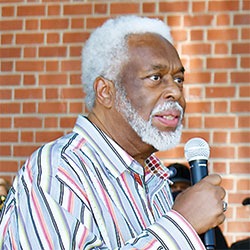In my last Sentinel column I asked the question: How does one preach during election time? I did so because on the national level there was and still is so much conversation on that topic.

One leading Christian podcaster, Carey Nieuwhof, did a series of interviews on that very topic. This interview series included one on a leading theologian, N.T. Wright, and pastor and author, Rich Villodas. These interviews showed there was a need for pastors to consider what they were saying in such divisive times — especially when some Christians had taken a very political stand on the issues.
I also addressed this issue because often those sitting in the pews are silent. Not only silent, but often taking the words of their pastor as Gospel, even though pastors are human, just like those who are sitting in the pews.
I purposely did not write the first column to tell others what to preach, because we all approach scripture from different contexts, with our own presuppositions. However, after a month of, I hope, others reflecting on what I said, I thought I would share what I preach during, before, and after election time.
My preaching focus is the Old Testament and the Gospels. The Old Testament was the only Bible that Jesus and the early Church had. I Thessalonians, the oldest book in the New Testament, was written years after the death of Jesus because many of the followers of Jesus were dying. I focus on the Gospels, because it is the story of God in human flesh.
I believe that Jesus came not only to die for our sins, but to live a life that would serve as an example of how we should live. In fact, if Jesus came only to die for our sins, God could have sent Jesus straight to the cross.
On occasions, I preach from the various letters. In fact, I am just completing a series on the Book of James that was written by the brother of Jesus. The Book of James not only shows the writers’ understanding of the Old Testaments, it also speaks to, in my opinion, many of the challenges we face as a nation today.
I love preaching from Luke 4:13, where Jesus said He came to set the captives free. Many in Israel were captives of an oppressive Roman government, which their religious leaders were in bed with. Jesus wants to free those who are captive to the many “isms” of today.
The Story of the Good Samaritan is another. Jesus is saying our neighbors are anyone God places in our path. And that we are to show them mercy.
Matthew 2:31-46 is also a powerful text. It instructs that when we see people who are hungry to feed them. When we see people thirsty to give them a drink. When we see a stranger to welcome them, or someone naked, you should give them clothes to wear. Take care of the sick or visit those in prison. Jesus said that when we do these things, we have done those things for Him.
I love the Prophets so much that many call me an Old Testament preacher. I take that as a compliment, because Jesus followed in the prophetic tradition. However, I love preaching from the prophets because they speak power to injustice. We also know their names even though they stood up to the temple priest who supported evil kings in those days.
I preach what I preach because I know that one day I will have to answer for what I preach. I prepare through prayer and meditation. Every Sunday, I ask God to forgive me, if I didn’t get it right.
Pray that what you preach is pleasing to God, even though it might not be pleasing to humans.
(The Rev. Leonard Edloe is a pharmacist, educator and pastor of New Hope Fellowship Church in Hartfield.)



